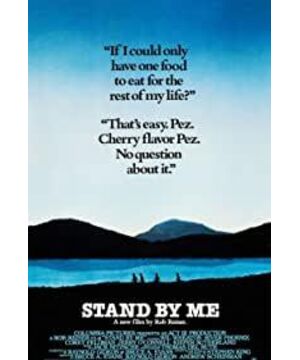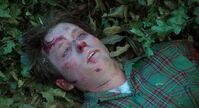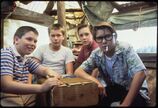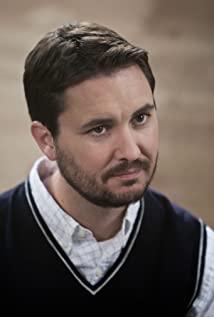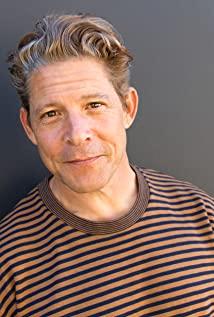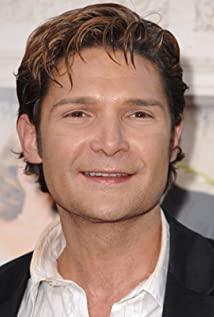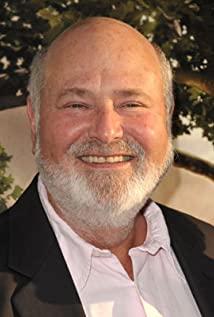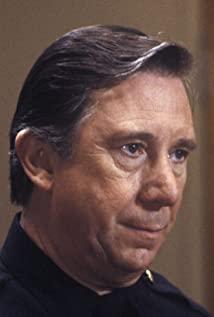The film "Walk with Me" is adapted from Stephen King's novel "The Corpse".
Stephen King used this novel to cherish the memory of his teenage years. The director Rob Reiner used this film to tell a story about a teenager. On top of the remembrance, he added a faint sense of fatalism far greater than sadness. .
Rob Reiner is a typical director who is more popular than others. A few years later, his more famous film "Ten Days in Crisis" was also adapted from Stephen King's novel of the same name. In addition, he also directed business cards such as "When Harry Meets Sally", "Fucked", "A Few Good People", and "The Bucket List".
But when it comes to my favorite work, it's the 1986 "Walk Together".
The first thing that attracted me to this movie was its temperament .
It is different from ordinary juvenile films or memoir movies. Usual memoir movies reappear in the past, which is to set the time back in the past and let the past emerge.
But "Walk with Me" is different. It is not "reappearing from the past", but " coming back to the past ."
To put it bluntly , it is looking back at the past with the eyes of the moment .
There is a sense of distance in it, and that sense of distance is intuitively expressed as a filter of the picture, like a mist of time.
On the other hand, it is also reflected in the fate of the characters.
Because standing at this moment, the fate of all characters is an established fact. Looking at that time in this way, there is an extra care .
The subtext behind that care is: If you know that the future will be like this, it should be better for you in the first place. At least, we should say goodbye.
The smell of reluctance is simply too charming.
What pushes this taste to the extreme is that at the end of the film, the four friends are separated at the intersection.
As if they had foreseen "Farewell" in advance, every sentence, every smile, and every look back was very meaningful.
Of course they don't have the ability to predict. The director who has this ability is the director.
It was the director who arranged such a goodbye for them.
Because only that kind of goodbye is worthy of the adventure they just experienced together.
What kind of adventure is it?
It's intriguing to say.
The four children set up on the road, traversed the town, waded across the river, and entered the depths of the dense forest in order to see the dead body of another child.
They were so excited that they wanted to be the first to find the missing boy's body and become the hero of the town.
Yes, this is a journey towards "death".
Just like life, the end is the same.
But what drove them on the road, apart from pure "curiosity" and sudden "heroic dreams", there was a deeper motivation.
what is it then?
As the film unfolded, we gradually walked into that era, the life of that small town and four children.
It was the summer of 1959, a small town of Kairos where only 1281 people lived.
That small town is too small, as if you can see it at a glance. But for the children in town, this is their world.
Like the borders of the town, everyone's fate is still visible at a glance.
Many of the children here are unable to complete their studies and enter the technical school early to learn a craft to make a living. Then, like their parents, spent their lives in the small town.
The future is slim, and the four teenagers in the film are even more embarrassed at this moment.
They each live in broken families.
Chris grew up in a notorious family. He never doubted that he would grow up to be a bad person. Everyone in the town believed in this.
Wien's situation is similar, and he has long been sentenced to a bad life by his bad family.
Teddy’s father was a madman. He was a war hero. I don’t know if he was emotionally out of control because of the trauma of the war. This also made Teddy live in the worship and fear of his father, and became a crazy child. .
The one who looks better is Gaudi.
He is a character based on Stephen King and the narrator of the entire story. He originally had a good family, but his parents overly favored his elder brother. Until the accidental death of his elder brother, they never got out of the shadows, and Gaudi became a transparent person who no one cared about.
It is these four teenagers who have become the best partners.
They often gather in the tree house, smoking, playing cards, nonsense, giggling...
Although they are only 12 or 3 years old, their hopeless future and difficult moments urge them to mature prematurely.
Perhaps, it is not just premature, but premature aging.
Yes, the teenagers in "Along with Me" are the premature aging generation.
They lost interest in life prematurely, so that the only thing that attracted them was "death."
So they hit the road.
They are going to find the corpse of another teenager, and they are going to uncover the mystery of "death"-the last mystery that stands in front of them.
Finally, they walked for a whole day, escaped the chase of the train, heard the howling of coyotes at night, patted all the leeches, and came to the depths of the woods.
The corpse of the boy was lying on the ground contortedly.
He opened his eyes wide, his face was gray, and his body had begun to decay.
At that moment, the four teenagers who were travelling with him suddenly realized that "death" was not as mysterious as imagined. On the contrary, it is too realistic and too cruel. It only means the complete end of a life.
What is revealed at the same time as the secret of death is the hidden theme of the film: what actually killed these children?
Perhaps it was a train passing by accidentally, and it was a misfortune.
But it is more likely to be a rotten family, a bad father and brother, an irresponsible teacher, a short-sighted, terrifying town that has buried countless generations.
A very interesting scene in the film is staged next to the corpse.
Several gangsters from the small town rushed to grab the corpse and take the credit.
At this moment, Teddy and Wayne ran away in fright, but Gaudi and Chris stayed bravely and pointed their guns at the gangsters.
The film has been trying to establish a counterpoint for us, so we can't help but think that those few idlers are the future of these four teenagers.
But at this moment, two teenagers picked up their guns and pointed at the future.
It's like a declaration, declaring that you don't want to be such a bad adult.
And the fact is exactly the same.
In the end, Gaudi and Chris fled the town, one became a writer and the other became a lawyer; while Teddy and Wayne stayed in the town and became part of the town.
The ending of this story has long been settled deep in the dense forest.
The corpse of the young man was silently writing a prediction for everyone's future .
Some people are alive but seem to be dead.
Some people grow up instantly, bid farewell to the past, and are reborn in a new place.
Of course, everything I have said may only be a very small part of this movie.
What I didn't write down, or what I couldn't find an accurate prediction to describe, is the more fascinating thing about this movie.
It was by the bonfire in the woods at night, and Gaudi told everyone the story of the pie contest.
It was a small deer that happened by chance beside the railway.
That was the last apology left by Teddy.
That was when Chris put his arms around Gaudi’s shoulders and said: "God gave you a gift, and you are good at telling stories. You have to cherish it. If your parents can't protect you, then I have to do it."
It was an innocent friendship that was so nostalgic and infinitely sad.
That friendship stayed forever in the summer of 1959.
So many years later, the middle-aged Gaudí wrote this sentence at the more distant end of this story:
" I never made friends as good as I was when I was 12 years old. "
"Isn't everyone like this?"
View more about Stand by Me reviews


